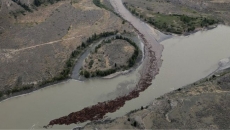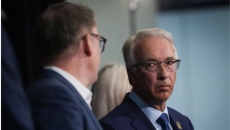Mayors, First Nations leaders, and law enforcement officials are pleading with the federal and provincial governments to take "immediate action" to address what they call dual "crises" of public safety and mental health issues in communities across British Columbia.
At a news conference Monday, Vancouver Mayor Ken Sim and several other politicians from around B.C. announced the request to senior levels of government, touting a letter sent to Premier David Eby and Prime Minister Justin Trudeau calling for action on "three critical fronts."
Today, I stood alongside my fellow BC leaders, united in our call for urgent action on public safety, mental health, and the addictions crisis.
— Mayor Ken Sim (@KenSimCity) September 16, 2024
We're pushing for real change - asking the Federal Government for the legal and financial support to make mandatory care a reality,… pic.twitter.com/WpcQ3BwsJo
The letter, signed by 10 mayors, three First Nations leaders, Vancouver's police chief and others, calls on the governments to bring in "mandatory care" for people with severe mental health and addiction disorders, reform the bail system for repeat offenders and the "bolstering" of policing at Metro Vancouver's ports.
Vancouver Mayor Ken Sim said at a news conference Monday that the "broad based coalition" behind the letter is "demanding immediate action to be taken on public safety and mental health crises gripping Vancouver and other communities."
"We can't afford to let this continue any longer," Sim said. "We can't afford to let people fall through the cracks. The number of individuals that are battling severe mental health and addiction issues and pose a risk to themselves and others due to a lack of adequate care has reached a critical point."
Sim applauded Eby's announcement Sunday to provide mandatory involuntary care under the Mental Health Act for those with severe addictions who are mentally ill with the creation of 400 mental health beds across the province.
The "current system" has failed British Columbians, he said.
"We know this is going to require a ton of effort, years of effort, millions of dollars, and a transformative investment in a new approach to health care," Sim said. "We also know that this issue is not isolated to just Vancouver, it is affecting our entire country."
Their letter says senior governments also need to bring in "meaningful bail reform" for repeat offenders, and the federal government must improve policing at Metro Vancouver ports to stop illicit drugs from coming in and stolen vehicles from being exported.
Vancouver Police Chief Adam Palmer said at the news conference that repeat violent offenders are too often released on bail due to a "revolving door of justice."
He said a new approach is needed to deal with mentally ill people who "pose a serious and immediate danger to themselves and others," especially in light of the deadly stranger attack on Sept. 4, where a mentally ill man is accused of killing one man and severing another man's hand in Vancouver.
Palmer said crime has been trending down in the city, but it's "cold comfort" to people in light of news of repeat offenders being let out of jail who go on to commit violent acts while in a state of psychosis.
The chief also said Vancouver's ports are often the source of the continued proliferation of illicit drugs and other illegal items into the province.
"We know that all of these things impact our sense of safety and well-being and can cause fear in our communities," he said. "Existing public policy decisions and approaches by higher levels of government have been inadequate and are not working. They're full of gaps and they have led to significant public safety concerns."
Activist Garth Mullins with the Vancouver Area Network of Drug Users said Monday that the system of mandatory care that's on the table in the lead up to the provincial election is "a big step backwards."
He said the solutions put forward by politicians and police seem intent on "locking up drug users," instead of creating an accessible system of voluntary treatment.
He said the province has tried involuntary care in the past, "but what we've learned is it doesn't work."
Mullins said the prospect of being subject to involuntary treatment could scare people away from asking for voluntary care, which he said is often not an option for those who want it.
"I don't know if I'm going to be feeling very good going to my methadone doctor if I know that she has the power to lock me up if she doesn't like the progress I'm making," he said. "So, we should build a voluntary treatment (system) that opens the door for people before we build a system of involuntary treatment that locks it behind them."
Mullins said he fears more people will die and B.C. will gain a "cruel reputation" if involuntary care becomes the norm.






